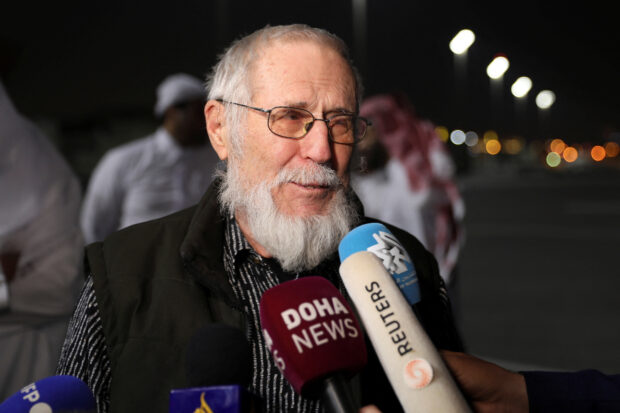Austrian extremist released after months held in Afghanistan

Released Taliban hostage and Austrian national Herbert Fritz speaks with the media after disembarking from a plane in Doha, Qatar, February 25, 2024. REUTERS/Arafat Barbakh
Doha, Qatar — An Austrian far-right extremist who visited Afghanistan reportedly to prove it was a safe country was released on Sunday after nine months in detention there.
Herbert Fritz, 84, who, according to Austrian media, has close links to the far-right extremist scene, arrived in the Qatari capital, Doha, after being freed by Taliban authorities.
READ: The Taliban are entrenched in Afghanistan after 2 years of rule. Women and girls pay the price
Fritz was arrested in May after defying Austria’s long-standing warning against travel to Afghanistan, which in 2021 returned to the rule of the Taliban, who imposed a strict interpretation of Islam.
“I think it was bad luck, but I want to visit again,” he told reporters on arrival in Doha when asked about his ordeal.
“There were some nice people but there were some foolish people also, I’m sorry,” Fritz added, describing his captors.
Austrian authorities thanked Qatar, the gas-rich Gulf emirate, for aiding Fritz’s release and said he may receive medical care in Doha before flying home.
The Taliban government’s interior and foreign ministries did not respond to a request for comment.
According to Austrian newspaper Der Standard, one of Fritz’s passions was visiting “dangerous” places, including Afghanistan in the 1980s and eastern Ukraine in recent years.
READ: Taliban official says women lose value if their faces are visible to men in public
Trying to prove that Taliban-ruled Afghanistan is safe, he traveled there last year and published an article titled “Vacations with the Taliban” via a far-right media outlet.
He was arrested shortly afterwards on suspicion of espionage, Der Standard said. Such travel reports might have been a bid to portray Afghanistan as a safe country to return Afghan refugees to, the newspaper added.
In the past, according to Austrian media, Fritz has met Kurdish leader Abdullah Ocalan — currently jailed in Turkey.
He also reportedly visited fighters of the People’s Protection Units (YPG), the main component of the Syrian Democratic Forces, the de facto army of the Kurdish semi-autonomous administration in Syria’s northeast.
Turkey views the YPG as an offshoot of the Kurdistan Workers’ Party (PKK) — a group designated by Ankara and many of its Western allies as a terrorist organization.